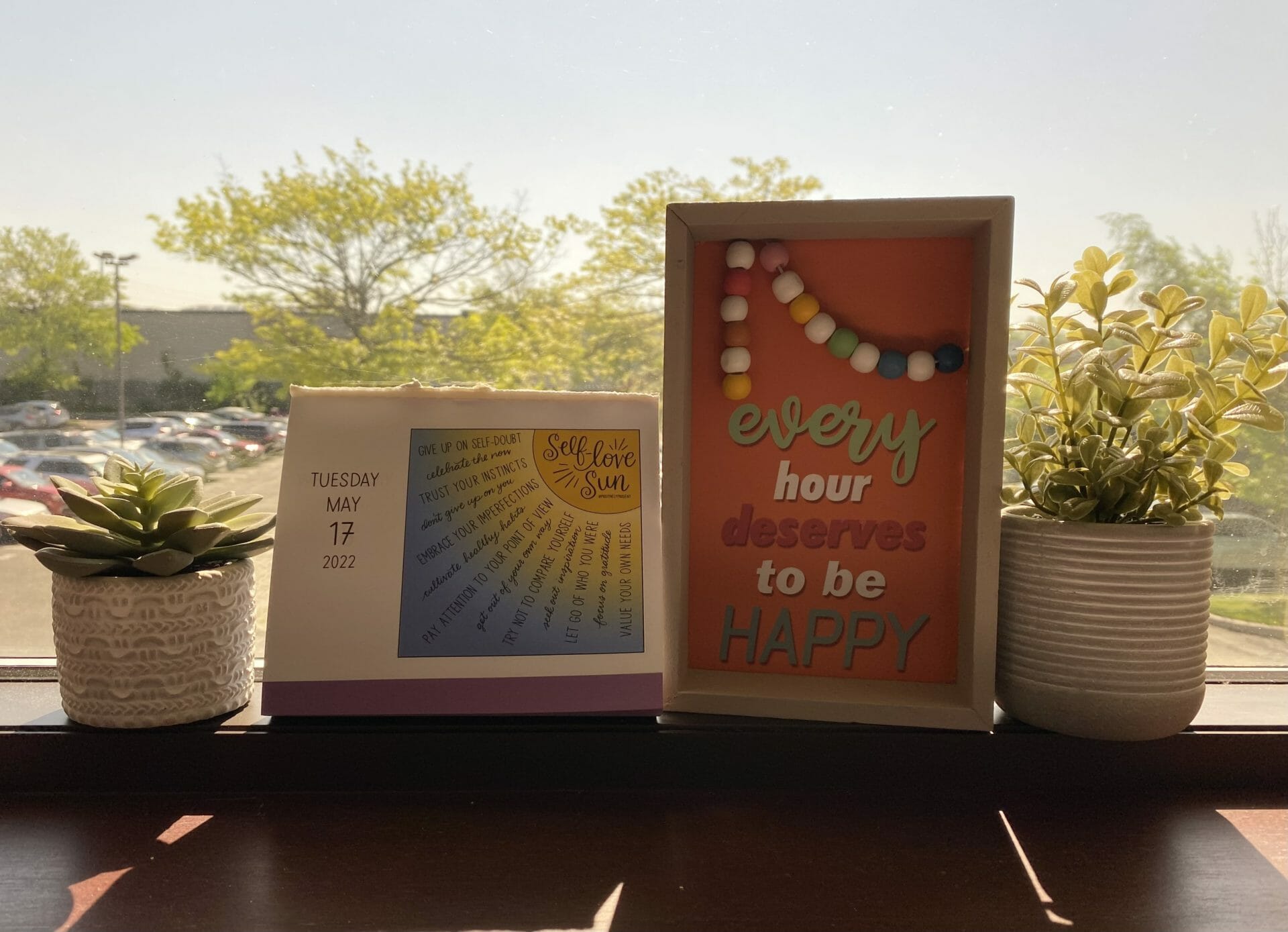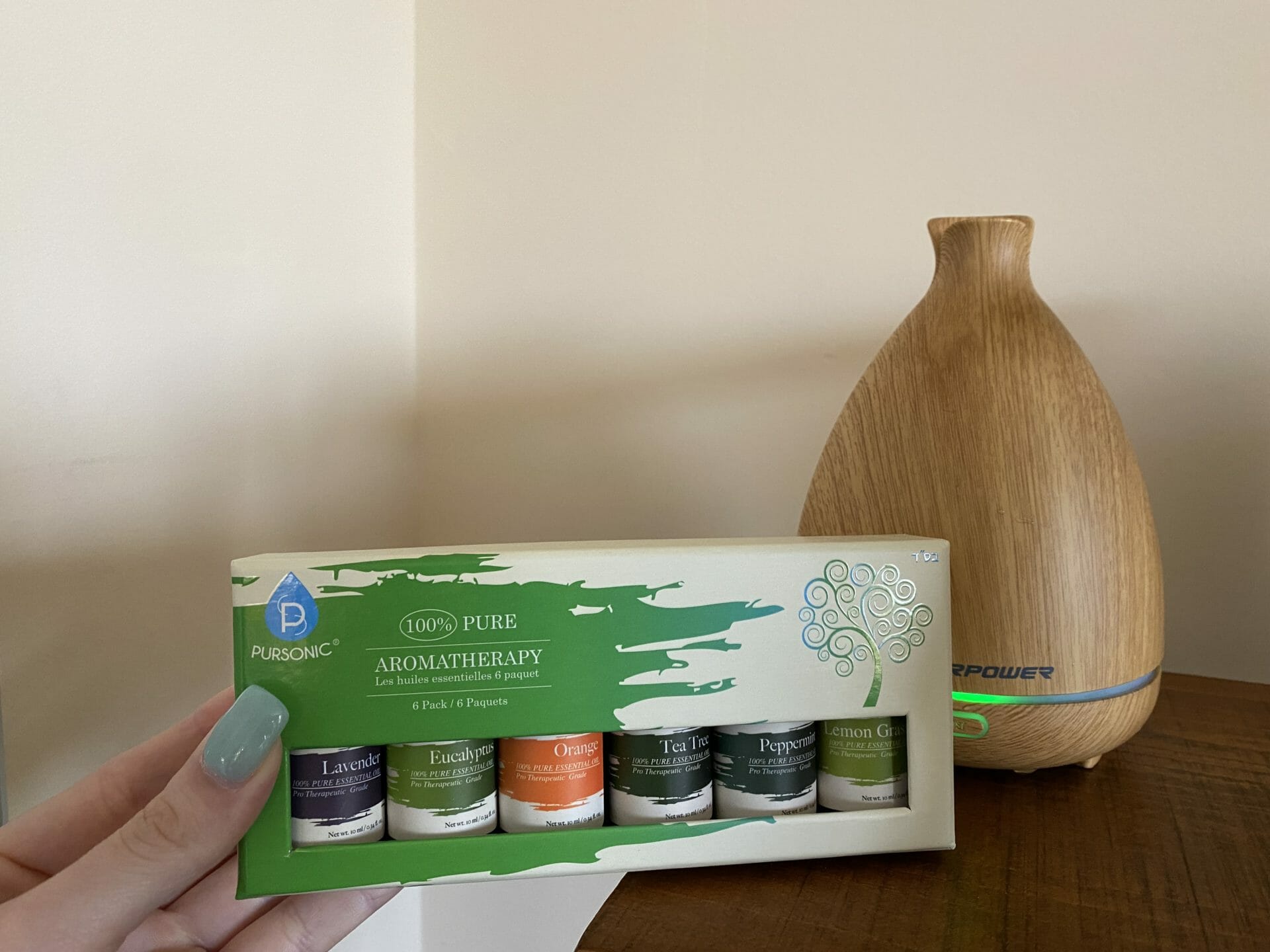By Maggie Gioia | Marketing Coordinator
May is Mental Health Awareness Month and National Convenience Distributors takes the mental health of their employees seriously. That’s why we spoke with Stephanie Grindell, a licensed mental health counselor, to help us find the top three workplace wellness tips proven to benefit mental health.
#1 Create A Zen Space
The Buddhist philosophy of “zen” emphasizes meditation, intuition and tranquility in order break from routine and instead live more mindfully. The modern business world is becoming increasingly fast paced and demanding, but utilizing “zen” principles can mitigate resulting stress. While many offices are opting to create a “zen” room for employees to take a moment for themselves, NCD encourages employees to make their work area their own in hopes of creating a more inclusive space with a lower rate of burnout and a higher rate of productivity. When “zen” practices are applied, the work-life balance is elevated and employee communication, collaboration, calmness and focus are improved.
Here are some “zen” influenced changes you can make:
Surround yourself with inspiring words, motivational quotes or joyful art. “Zen” recognizes the power of mantras. Including meaningful words in your space intentionally take them in can help guide your day in a more positive direction. If you aspire to achieve those words, let them be a reminder of your goals. Even taking a brief look at a print that brings a smile to your face or makes you giggle can be a huge mood booster.
“What we tell ourselves, impacts us,” said Grindell. “In other words, if I tell myself negative things, I’m going to feel negatively, so I might as well tell myself positive things so I can feel positively. Inspiring quotes and pictures can be that extra push in successful reassurance.”
Adding greenery to your space can be just as important. A natural element can bring a feeling of harmony to your work environment. Small, office-friendly plants promote better air quality and provide visual relief from screen and text stimuli.
“You should decorate your space with items that you find to be soothing. For many people nature offers an escape. So including things from nature can be helpful,” said Grindell.
Essential oils, either used on their own or in diffuser, have been shown to establish a sense of peace and symbiosis. Several common essential oils aid the body in calming down, sharpening focus, increasing energy, opening the sinuses and boosting energy, among many other uses that can be customized to your needs.
“There’s research that shows that essential oils can assist the body and mind. Lavender is calming, citrus is awakening and peppermint relieves tension such as headaches. And those are just the most popular oils,” said Grindell. “It’s really about finding what works for you. And even if it doesn’t work, at least you or your room will smell good!”
Bonus: Get organized!
“A messy and cluttered workspace is anxiety-inducing. A clean and tidy space sets your brain up for success and productivity since the amount of information it has to process about your surroundings is reduced,” said Grindell. “It’s a small act that can go a long way.”
Here are some examples from NCD’s Marketing Studio!


#2 Take Strategic Breaks
Taking breaks throughout the day is an effective way to cultivate your mental health. Fill this break time strategically by getting outside, exercising, stretching, drinking water, having a nourishing snack, or meditating to maximize the mental health benefits.
“It’s all about finding little moments throughout the day to pause and check in with yourself. If you ask others how they’re doing, why don’t you treat yourself the same way? Notice when stress starts to rise, and then take action,” said Grindell.
“You’re most productive when you take care of yourself and are feeling good. Breaking for movement, hydration and the right snacks is good for your health, and it can boost serotonin and dopamine, which are the feel-good hormones,” explained Grindell.
“Another great way to refocus and refresh your brain is through meditation. There are so many apps out there, but I suggest using YouTube for guided meditations because its free and there are endless video options. Guided meditations will readjust your energy and give your brain an needed rest.”


#3 Use These Coping Mechanisms
Feeling overwhelmed and nothing seems to do the trick? Here are some tried and true “TIPPs” used by therapists everywhere to help you recenter.
What is TIPP? TIPP stands for temperature, intense exercise, progressive muscle relaxation and paced breathing. Let’s take a look at some examples.
Splashing cold water on your face or other parts of the body can pull you out of negative emotions and reset you. This process occurs because “temperature changes activate your dive reflex, which is a moment where the brain forces the body to pay attention,” said Grindell.
“When it’s cold, your brain sends a signal to your body that you’re in water. This is healthy distraction from whatever you may be feeling. Beyond splashing cold water, this is why some people take cold or hot showers or have really hot or really cold drinks. This should be done safely and not too extreme of course.”
Intense exercise shocks the system in a similar way by getting rid of negative energy.
“Feeling stressed is a form of excess energy. By doing intense exercise, your body is able to expel this excess energy,” said Grindell. “It’s like setting the reset button, which is vital to mental health.”
A full workout would be ideal for mental and physical health, but you can modify intense exercise to be within the means of your location. “If you’re at the office, just doing ten jumping jacks or going on a brisk walk will work,” said Grindell.
Progressive muscle relaxation is equally effective.
“You can try squeezing something really hard [like a stress ball] for a few seconds, then release for a few seconds and continue the pattern until you feel better. Others prefer to bring their shoulders up and hold tightly for a few seconds, then let them relax and fall back down. There are a lot of different progressive muscle relaxation exercises you can practice to let your mind refocus and your body de-stress, and they’re all things you can easily do from your desk,” said Grindell.
Lastly, practicing paced breathing decreases stress levels.
“Breathing exercises are something you can do from anywhere. You can try inhaling for five seconds, holding for five seconds and exhaling for seven seconds. You always want to exhale a little bit longer to breathe all the tension out,” said Grindell. “Paced breathing not only does it force your brain to focus on something else, but it also slows down your heart rate, which rises when you are stressed. It’s grounding and centering. It’s all about pulling yourself back into the present moment.”


Conclusion
In the United States, the office is often synonymous with stress and other mental health challenges. According to a study conducted in 2019, 94% of Americans report experiencing stress at their jobs, with chronic stress leading to severe long-term and short-term effects on both mental and physical health. But no company wants that for its employees, especially NCD. Instead, you can support your well-being and target your mental health with the provided, office-safe techniques.
“If we spend 40 hours per week of our lives working, we might as well do our best to feel comfortable and happy, and it’s as simple as noticing and taking those little moments for yourself throughout the day,” said Grindell.
